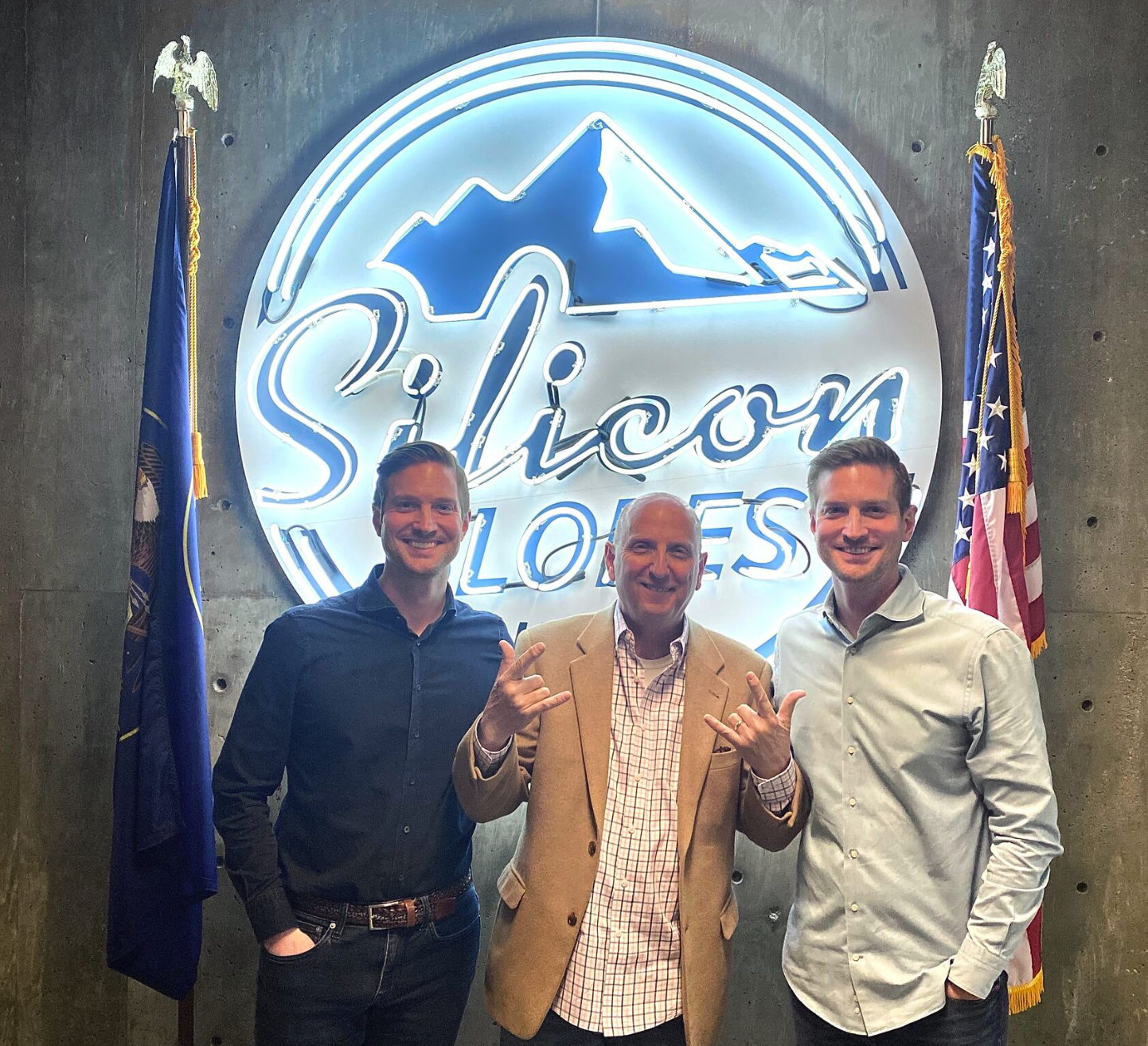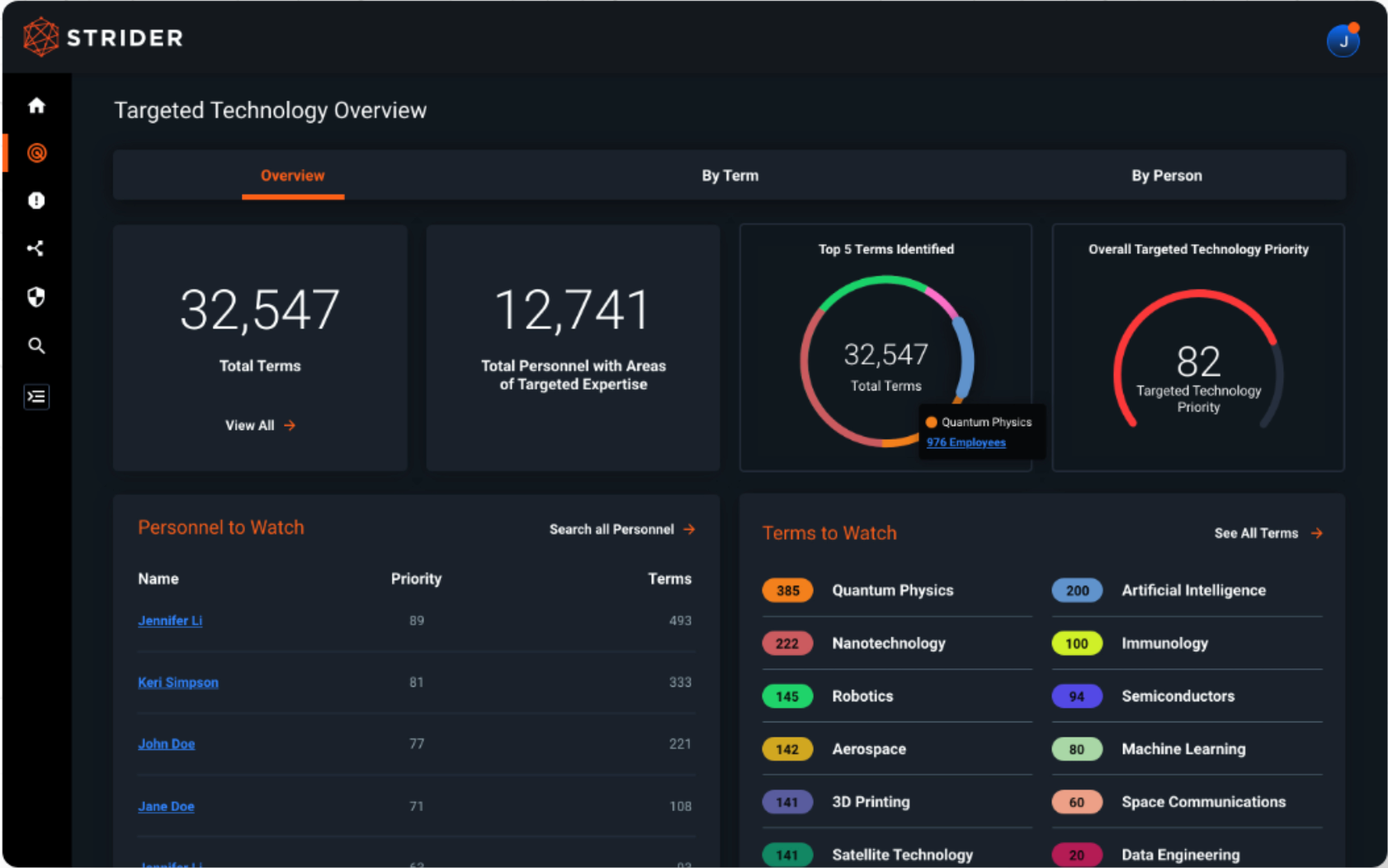By sourcing and interpreting over 30,000 sources of “digital exhaust” today, Strider Technologies is helping provide its clients with timely, relevant, and actionable information security data so they can make the best decisions for dealing with bad actors on a global basis, whether corporate or governmental.
Upwards of $600 billion. Per year.
That was the staggering figure that the Office of the United States Trade Representative came up with when asked,
“How much money is lost by U.S. business each year due to intellectual property theft by the People’s Republic of China?”
According to Greg Levesque, the inflection point for him that led to the creation of what became Strider Technologies occurred in 2016.
That was the year when three economists were tasked by the USTR with evaluating the amount of money U.S. businesses lost annually due to IP theft by China.
“Their job was to assess what is the total economic cost to the U.S. economy on an annualized basis from China’s IP theft,” Greg explained. “And the number they came up with in terms of scope and scale is daunting. It was between $400 [billion] to $600 billion per year in economic loss to the U.S. from IP theft.”
That report led Greg and his twin brother Eric to ask the rhetorical question, “Who is addressing that problem?”
And at the end of the day their answer was simple yet shocking: No one.
The Similar then Divergent Paths of the Levesque Twins that Led Back to Utah and Strider Technologies
Though Greg and Eric were raised in Maine, they both received bachelor’s degrees in economics from Utah State University.
Their careers diverged, however, as Greg pursued a path of serving various governmental entities in the Washington, D.C. area after receiving his master’s degree in international relations and national security studies from Georgetown University. Conversely, Eric ended up on Wall Street and working in the financial markets after receiving his MBA from Brigham Young University.
Yet when I visited with them recently they confirmed that like many identical twins, they stayed in close contact and regularly shared similar insights and observations with each other from their respective careers.

And then the 2016 USTR data was released.
Although their official response wasn’t immediate, the twins joined forces in May 2019 with a third co-founder (CTO, Mike Brown) to formally launch Strider Technologies in South Jordan, Utah.

The company hit my radar a few weeks back when Strider announced in late April it had raised $45 million in a Series B round of funding, bringing its total raised to $59 million in three years.
The round was led by Valor Equity Partners, with participation from existing investors DataTribe, Koch Disruptive Technologies, and One9 Ventures.
Based upon my conversation with Greg and Eric, domestic and international interest in Strider has been explosive since the beginning of 2022, in large measure driven by the events leading up to, and the ongoing fallout from, Russia’s invasion of Ukraine.
In fact, Strider experienced 400% growth in annual recurring revenue in the first part of 2022, with a 100% client retention rate in 2021.
Strider’s Secret Sauce: One-Off Timely, Relevant, and Actionable Information Parsed from Over 30,000 Data Sources
According to its website, Strider has launched what it terms as a Strategic Intelligence Platform. What does that mean?
Simply, Strider has built its own proprietary data-gathering and sifting solution, one that sits on the internet and allows executive teams to connect the dots between disparate data points and derive actionable insights from this information, to not only see the horizon, but to see beyond the event horizon.

According to Greg, what Strider has put together is an artificial intelligence engine with the ability to identify, collect, and filter something it calls “digital exhaust.”
“What it means is we live in a world where, because of the Internet of Things, most people, most companies have what we call digital exhaust. You can even say that nation states have this. So if you have digital exhaust, it is, in essence, collectible.”
Clearly, the global COVID-19 pandemic led to an explosive amount of data being shared online, because, he said, it had to be.
In its current iteration, Strider currently tracks the digital exhaust from over 30,000 different digital exhaust pipes and has upwards of three billion unique data objects in its system. So far.
But as Chief Operating Officer Eric explained, Strider has built everything in house.
“We’re a vertically integrated data business. So we’re doing the collection and delivery and everything in between.…We take a very focused approach to what type of data products we want to build and deliver, and really it’s about the use case we want to enable and the problem we want to solve.”
Strider currently provides clients two main service options:
With its risk intelligence offering, Strider provides insights into “the intersection between your core technologies and those targeted by nation-state actors.”
Examples of how Strider helps its clientele via risk intelligence is through analysis of, and dashboard-level access to,
- Competitor ties (inbound and outbound),
- Risk signals, and
- Targeted technologies,
as shown below.

Conversely, with Strider Shield,
“(Strider) delivers high fidelity risk signals connected to known actors and TTPs [tactics, techniques, and procedures]....(to provide) actionable and contextualized insights that decrease investigation times, expand visibility into emerging risk landscapes, and move security and legal teams to a proactive risk management posture.”
When considering where Strider’s services fit within today’s world, Eric was quite succinct: “Data is becoming a means of production.”
“So when you think about capital, labor, and land, those historically are the three means of production. There is actually one country that has, officially, made it [data] one of the means of production. And that’s China.
“So they are actually building policy around that, through that economic lens. And if companies and governments around the world aren’t waking up to that and understanding it, they’re gonna be left behind.”
To provide the most value to its customers, Strider does not take a one-size-fits-all approach.
Rather, as Greg said, it customizes the data and information flows that it provides each client.
“The way that we deliver this to our customers is that we process that and refine it to data is only relevant to them. So back to that point of we want to deliver high-value, actionable data. What that means is you can’t just open a data lake and say, ‘Here’s the search function.’
“Now I put the burden back onto you to do all the discovery, to go find what matters. We refine that down to the specific organization, and then we create a dashboard for them. There are some security steps you have to take to get access to it, but what that also does is it makes it really refined and actionable for those folks. So it’s relevant for them, it’s timely, and it drives the mission objectives they have.”
It can’t just be interesting, he added. “It has to be actionable.”
With the recent funding, Strider will continue to invest in its tech infrastructure, and its research and development, including beefing up its AI efforts, plus a move into machine learning as its databases get large enough.
Primary target customers are in North America and Europe, as well as other parts around the world, with industries ranging from government agencies to research institutions and Fortune 500 companies, especially those with heavy R&D spend.
“Great power competition is back; economic statecraft is back,” Greg said. “These are things that used to be a normal course of geopolitical rivalry and conflict.”
And for its part, Strider is totally dedicated to helping its various clients to come off victorious through the best delivery of vetted infosec data and information on a timely basis.
AUTHOR'S NOTE: To watch the full interview of Greg and Eric Levesque, please click here to watch this episode of “Conversations” on SiliconSlopes.tv. Conversely, you can also listen to this interview on your favorite podcast provider at “Silicon Slopes Conversations;” case in point, via this link on Apple podcasts or via most popular podcast platforms.
Thank you.


